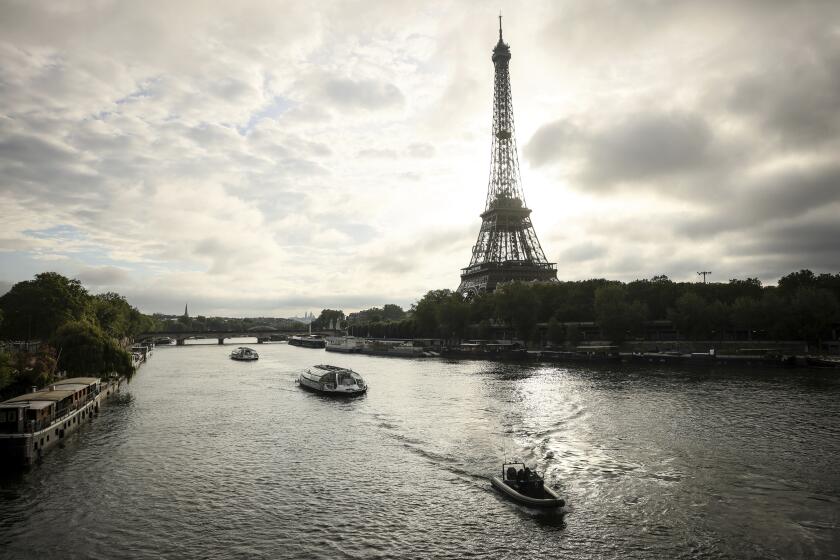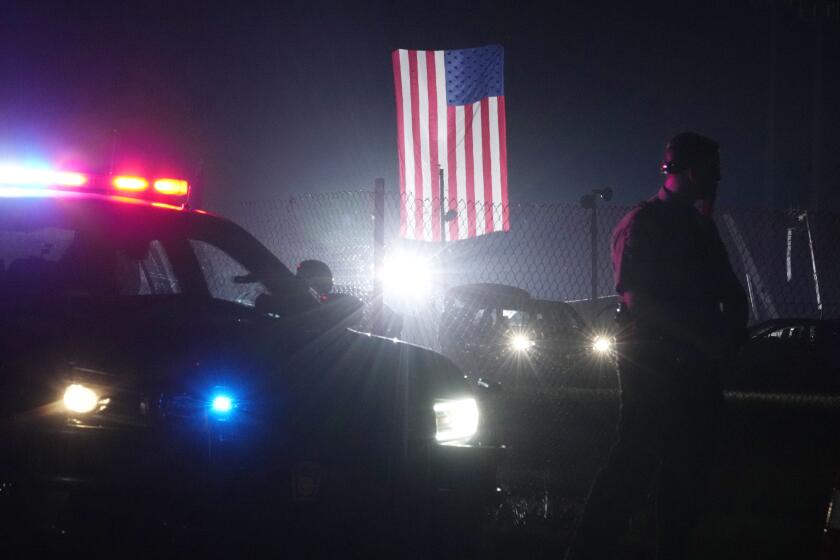Judge Orders Camarena Case Defendant Freed
More than two years after he was kidnaped at the behest of the Drug Enforcement Administration and brought to the United States from Mexico to stand trial, Dr. Humberto Alvarez Machain was ordered set free Monday by a federal judge who ruled that the case against him was so weak that the jury should not be allowed to consider it.
Alvarez Machain, a Guadalajara gynecologist who was charged with participating in the 1985 kidnap and murder of federal drug agent Enrique Camarena, bowed his head and cried after U.S. District Judge Edward Rafeedie announced his ruling to a packed courtroom.
“There is no proof that he participated in the conspiracy to kidnap Agent Camarena or that he even knew about it,” Rafeedie said, glowering at the prosecutors. “You may suspect that this happened. You may have a hunch that this happened. But cases should not go to the jury on suspicion or a hunch.”
Rafeedie’s ruling disappointed drug agents who gathered in court for the announcement, and it appeared to bring an abrupt end to a case that has repeatedly tested U.S.-Mexican relations. Mexican officials vigorously protested Alvarez Machain’s 1990 abduction, and they labeled his trial illegal and immoral.
Despite those protests, the U.S. Supreme Court ruled in June that Alvarez Machain’s abduction did not violate the extradition treaty between the United States and Mexico, and the court ordered the defendant to stand trial. Rafeedie’s decision does not affect the U.S. Supreme Court’s view of the extradition treaty, nor does it clear Alvarez Machain’s co-defendant, Ruben Zuno Arce, of charges he faces.
Although Rafeedie’s ruling was unambiguous, even after it, government officials continued to resist releasing Alvarez Machain. Late Monday, prosecutors requested an emergency stay from the U.S. 9th Circuit Court of Appeals and also argued that they could not let Alvarez Machain go because he is in the country illegally.
However, Alvarez Machain is in the United States because he was kidnaped at the request of American authorities. “A federal judge tells them there’s not enough evidence to go to a jury and then they pull a stunt like this,” lawyer Alan Rubin, who represents Alvarez Machain, said of the last-minute glitch in his client’s release. “This government is totally out of control.”
Rubin and American Civil Liberties Union legal director Paul Hoffman were seeking an order from Rafeedie late Monday so that Alvarez Machain could be freed from custody.
“This is breathtaking,” Hoffman said. “They kidnaped him and brought him to this country, and now they say that he’s here illegally.”
A spokesman for Mexican President Carlos Salinas de Gortari called the situation “Kafkaesque” but declined further comment.
U.S. officials declined to comment on the appeal, but some privately acknowledged that it appeared to have little chance of succeeding. If it does not, Alvarez Machain could leave the country today.
Meanwhile, in Mexico City, Deputy Foreign Minister Andres Rozental said that although Alvarez Machain has been cleared by a judge, “the bilateral problem between Mexico and the United States regarding this issue remains because of the U.S. Supreme Court decision which undermines the extradition treaty.”
A government official, who asked not to be identified, said: “We will not give (Alvarez Machain) a hero’s welcome in Mexico. We have never vouched for him as an individual. It was the principle we were interested in, and that remains.”
Although some Mexican officials at one time said they wanted to try Alvarez Machain, his acquittal here appears likely to preclude that possibility now.
“If he had been returned when we asked for him, he would have been tried,” said a spokesman for President Salinas. “Now, it would be like trying him twice for the same crime. It is very difficult to try him again. It would be repeating a trial when the judge has said there is no proof.”
In Washington, top Justice Department officials declined comment on the embarrassing conclusion of their high-profile prosecution. But DEA Administrator Robert C. Bonner, a former judge and U.S. attorney, released a short statement saying that while the DEA disagreed with the ruling, “we respect it and will abide by it. The court’s decision will not deter DEA’s commitment to investigate all those responsible for the kidnap and murder of Special Agent Enrique Camarena.”
Jack Lawn, who headed the DEA until 1990 and now is an executive with the New York Yankees, said in an interview that he accepted the court’s decision but did not feel any remorse for Alvarez Machain, who has spent more than two years in custody while he and his lawyers fought this case.
“My sense is that there has been no injustice,” Lawn said. “I believe that we did all that we could to bring this case forward, and now the judge has ruled. . . . If anything, this proves that the system works.”
Outside of court, Rubin commended Rafeedie for acquitting Alvarez Machain, which Rubin called a “courageous decision.”
Rubin described Alvarez Machain’s April, 1990, abduction as “one of the largest miscarriages of justice” ever committed by the U.S. government. And he criticized prosecutors for bringing charges against his client and creating an international incident by kidnaping him--all the while with scant evidence to back up their allegations of his involvement.
“This man spent almost three years in jail on a charge that was not even supported enough to go to a jury,” Rubin said. “This was outrageous.”
Other legal experts were also stunned that the government would go to such lengths to kidnap and prosecute Alvarez Machain and then put on such a weak case against him.
“Good grief! Everyone assumed the guy was guilty as hell,” said Yale Kamisar, a University of Michigan law professor and recognized authority on criminal law. “A lot of people bit the bullet and said: ‘We went awfully far to kidnap him, and we got a lot of people mad at us, but after all he’s guilty of a heinous crime.’ And now this.”
The government, which rested its case last week, charged that Alvarez Machain administered an injection of lidocaine to Camarena to stabilize the agent’s heartbeat while he was being tortured. To back up that contention, prosecutors introduced as evidence a plastic syringe tainted with lidocaine and Vitamin B1 that was found at the house where Camarena was tortured.
They also produced a witness, Rene Lopez Romero, who said he saw Alvarez Machain washing out syringes in the kitchen of the house while Camarena was there.
But prosecutors did not show that Camarena had received the injection, and they conceded that they had no forensic evidence of lidocaine in his system. Camarena’s body was not discovered for almost a month after he was killed, and by then it had decomposed too much to allow toxicological testing, one government witness testified.
Without that evidence, prosecutors could not show directly that Camarena had received the injection that they accused Alvarez Machain of giving.
“There is absolutely no evidence that anyone injected Camarena with anything for any purpose whatsoever,” Rubin said in a brief submitted to the judge Monday morning. “The government has concocted this theory from whole cloth.”
In a statement given to authorities after he was brought to the United States, Alvarez Machain admitted that he was inside the house while Camarena was being tortured and said he had seen the agent inside. But he denied that he administered any drugs to Camarena.
Although conceding that no direct evidence showed that Alvarez Machain had administered the injection, Assistant U.S. Atty. John L. Carlton argued that jurors should be allowed to consider the facts and draw their own conclusions. He maintained that jurors could reach a guilty verdict by considering the doctor’s presence at the house, the tainted syringe and comments on a tape-recorded interrogation of Camarena that suggested that his captors were trying to revive him so that he could be tortured further.
Rafeedie disagreed, calling the prosecution’s case “wild speculation.”
“No rational jury could make a finding that this defendant should be found guilty of any of the crimes,” the judge added.
Drug enforcement agents first contacted Alvarez Machain several years ago, and tried on many occasions to lure him to the United States to be interviewed about the Camarena killing. Although an agent testified that Alvarez Machain several times indicated the he would cooperate, he never came.
Frustrated and driven to bring all suspects in the Camarena killing to justice, the DEA planned Alvarez Machain’s kidnaping and paid a band of Mexican citizens to carry it out. On April 2, 1990, Alvarez Machain was grabbed outside his office.
He was met at the El Paso, Tex., airport by DEA agents and was arrested.
Alvarez Machain protested, and his lawyers argued that his abduction was a violation of international law and of the extradition treaty with Mexico. Rafeedie agreed, as did the U.S. 9th Circuit Court of Appeals. But the U.S. Supreme Court overturned those rulings and ordered Alvarez Machain to stand trial.
That decision continues to rankle some observers on both sides of the border.
“There was a gross violation of international law that has never been remedied,” said ACLU lawyer Hoffman, who represented Alvarez Machain on issues related to his abduction. “We call on the Clinton Administration and the Congress to change the policy that led to this travesty of justice.”
Sergio Aguayo, a political scientist at the graduate Colegio de Mexico and an expert in U.S.-Mexico relations, agreed that Monday’s ruling does not resolve the larger issues surrounding the abduction.
“The decision reduces areas of friction between the two countries, although the precedent of the kidnaping remains, as does the U.S. Supreme Court decision,” he said. “The inheritance from Alvarez Machain is worrisome--that under U.S. law it is legally possible to do what you want in other countries.
“What a fiasco,” Aguayo added. “One would have expected them to have all of the judicial evidence before they kidnaped him, or why did they kidnap him to begin with?”
In fact, the government had even less evidence when Alvarez Machain was kidnaped. Only one witness testified that Alvarez Machain was at the house while Camarena was being tortured, and that witness did not implicate him until 1992.
Hoffman and Rubin said they hoped that the government would compensate Alvarez Machain for the time he has spent in custody. Justice Department officials would not comment on that request.
Staff writers Robert L. Jackson in Washington and Marjorie Miller in Mexico City contributed to this story.
More to Read
Start your day right
Sign up for Essential California for news, features and recommendations from the L.A. Times and beyond in your inbox six days a week.
You may occasionally receive promotional content from the Los Angeles Times.







